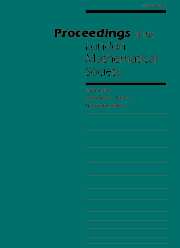Article contents
Weak covering properties of weak topologies
Published online by Cambridge University Press: 01 September 1997
Abstract
We consider covering properties of weak topologies of Banach spaces, especially of weak or point-wise topologies of function spaces $C(K)$, for compact spaces $K$. We answer questions posed by A. V. Arkhangel'skii, S. P. Gul'ko, and R. W. Hansell. Our main results are the following.A Banach space of density at most $\omega_1$ ishereditarily metaLindel\" of in its weak topology.If the weight of a compact space $K$ is at most $\omega_1$,then the spaces $C_w(K)$ and $C_p(K)$ are hereditarily metaLindel\" of.Let $\bar T$ be the one-point compactification of a tree $T$. Then the space $C_p(\bar T)$ is hereditarily $\sigma$-metacompact.If $T$ is an infinitely branching full tree of uncountable height and of cardinality bigger than ${\bf c}$, then the weak topology of the unit sphere of $C(\bar T)$ is not $\sigma$-fragmented by any metric.The space $C_p(\beta\omega_1)$ is neither metaLindel\" of nor $\sigma$-relatively metacompact.The space $C_p(\beta\omega_2)$ is not $\sigma$-relatively metaLindel\" of.Under the set-theoretic axiom $\diamondsuit$, there exists ascattered compact space $K_1$ such that the space $C_p(K_1)$ is not$\sigma$-relatively metacompact, and under a related axiom \boxd, thereexistsa scattered compact space $K_2$ such that the space $C_p(K_2)$ is not$\sigma$-relatively metaLindel\" of.
1991 Mathematics Subject Classification: 54C35, 46B20, 54E20, 54D30.
Information
- Type
- Research Article
- Information
- Proceedings of the London Mathematical Society , Volume 75 , Issue 2 , September 1997 , pp. 349 - 368
- Copyright
- London Mathematical Society 1997
- 12
- Cited by

